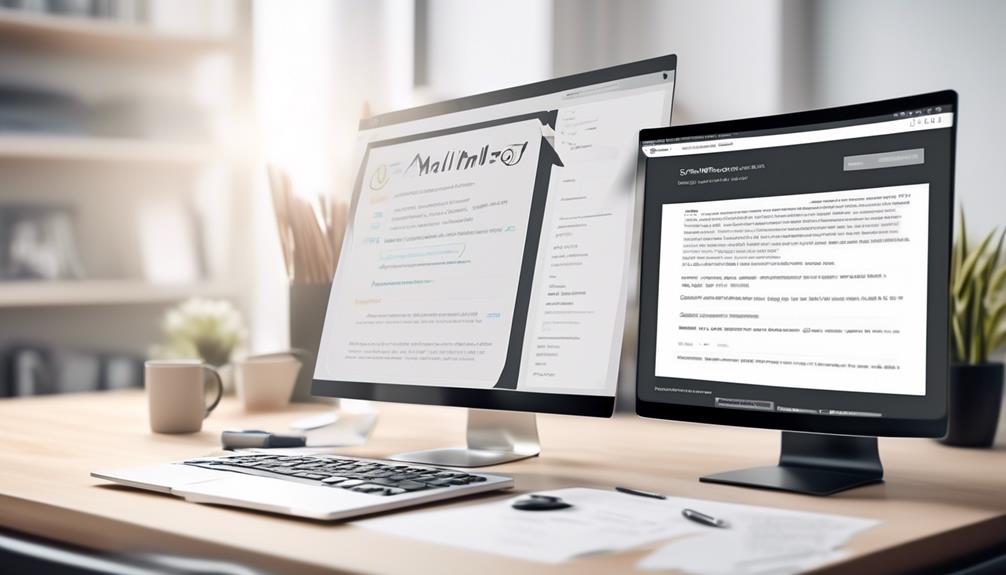We’ve all been in situations where skipping a meeting is like missing the last puzzle piece. It’s not the end of the world, but it leaves a sense of incompleteness. Anyone can relate to that empty feeling. Don’t miss out on the opportunity to connect and collaborate with others. Joining meetings can lead to valuable insights and connections. Don’t miss the chance to be a part of the bigger picture.
So, how do we convey our apologies in a way that not only acknowledges the inconvenience caused but also sets the stage for a potential rescheduling?
Well, let’s explore the art of crafting an apology email for missing a meeting and how it can pave the way for rebuilding professional rapport.
Key Takeaways
- Apologizing and taking responsibility for missing a meeting is crucial in maintaining professional relationships and demonstrating accountability.
- Valid reasons for missing a meeting include personal emergencies, conflicting schedules, miscommunication of meeting details, technical issues, or forgetfulness.
- When apologizing for missing a meeting, reach out to the relevant parties as soon as possible, express sincere regret, offer a transparent explanation if applicable, and make amends by catching up on missed work or providing a summary of the meeting’s key points.
- To avoid future missed meetings, prioritize and organize schedules effectively, communicate potential conflicts in advance, utilize reminders and calendar apps, establish work-life boundaries, and take proactive measures to prevent future absences.
Understanding the Importance of Apologizing
Understanding the importance of apologizing is vital in maintaining professional relationships and demonstrating accountability. When we miss a meeting, it’s essential to acknowledge the significance of the gathering and offer a sincere apology. Taking responsibility for our absence and recognizing any inconvenience caused is crucial.
We must understand that our actions can impact others and acknowledging the importance of the meeting in our apology email is a way to show that we value the time and efforts of our colleagues. By offering an explanation, if applicable, we can provide context for our absence and show that we understand the impact of our actions.
Maintaining professional relationships requires us to be empathetic and considerate of others’ time. Therefore, understanding the importance of apologizing in this context isn’t just about saying sorry; it’s about demonstrating respect, accountability, and a genuine desire to make amends.
In doing so, we can repair any damage caused by our absence and work towards rebuilding trust and goodwill.
Reasons for Missing a Meeting

Apologies for missing a meeting can stem from a variety of reasons, including personal emergencies, conflicting schedules, miscommunication of meeting details, technical issues, or simply forgetfulness.
When crafting an apology email for missing an important meeting, it’s crucial to acknowledge the reason for the absence. A personal emergency, such as a sudden illness or family crisis, is a valid reason for missing a meeting. Conflicting schedules may arise due to prior commitments or unforeseen work demands. Miscommunication of meeting details, like time or location, can lead to unintentional absence. Technical issues, such as internet connectivity problems or software malfunctions, might prevent attendance despite the best efforts. Lastly, forgetfulness can cause an unintentional absence from a meeting.
Whatever the reason, it’s essential to sincerely apologize for missing the meeting, express understanding of the inconvenience caused, and offer to make amends. By addressing the specific reason for missing the meeting in a professional apology email, it demonstrates a commitment to maintaining a positive relationship and ensuring future attendance.
Steps to Apologize for Missing a Meeting
After acknowledging the various reasons for missing a meeting, it’s important to understand the steps involved in crafting a sincere apology email.
Firstly, reaching out to the relevant parties as soon as possible is crucial. Promptly acknowledging the absence demonstrates professionalism and respect for others’ time.
Secondly, the apology email should be sincere and apologetic. Expressing regret for missing the meeting and acknowledging the inconvenience caused can go a long way in rebuilding trust and maintaining positive professional relationships. Additionally, if there’s a valid explanation for the absence, it should be offered in a transparent and honest manner. However, it’s important to avoid making excuses and instead focus on taking responsibility for the missed meeting.
Making amends is another vital step in the process of apologizing for missing a meeting. Offering to catch up on missed work or providing a summary of the meeting’s key points can help mitigate the impact of the absence.
Lastly, following up after sending the apology email shows a commitment to rectifying the situation and ensuring that the relationship remains positive and professional.
Please accept our sincerest apology for any inconvenience caused by our absence at the meeting.
Apology Email Templates

We understand the importance of crafting sincere and empathetic apology emails when missing a meeting, and providing appropriate templates can help streamline this process for professionals.
When drafting an apology email for missing a meeting, it’s essential to show respect, express regret, and offer a brief explanation if applicable.
One template approach is to apologize for any inconvenience caused by the absence and express regret for not being able to attend. Additionally, it’s important to suggest alternative dates and times to reschedule the meeting, demonstrating a commitment to making amends.
Another template could involve expressing regret and acknowledging the inconvenience caused, while also offering to make amends by proposing alternative ways to catch up on the missed meeting points.
It’s crucial to maintain a professional tone throughout the email and thank the recipient for their understanding.
Maintaining Work-Life Balance to Avoid Future Missed Meetings
To maintain a healthy work-life balance and minimize the risk of missing future meetings, it’s crucial to prioritize and organize our schedules effectively. Balancing work hours with personal time is essential for honoring our commitments and showing respect for others’ time.
It’s important to communicate any potential scheduling conflicts with colleagues in advance, as this demonstrates our commitment to our professional responsibilities. Setting reminders and utilizing calendar apps can help us stay on top of meeting times and avoid forgetfulness.
Additionally, establishing clear boundaries between work and personal life can help prevent burnout and reduce the risk of missed meetings due to personal emergencies. By maintaining a work-life balance, we show our dedication to our work while also acknowledging the importance of personal well-being.
When it comes to addressing missed meetings, it’s crucial to avoid making excuses and instead take responsibility for the inconvenience our absence may have caused. This approach demonstrates professionalism and a proactive attitude towards preventing future missed meetings.
Frequently Asked Questions
How Do You Apologize for Missing Meetings in an Email?
We apologize for missing meetings in an email by promptly acknowledging the oversight, explaining the reason for our absence, and expressing our regret.
It’s crucial to convey sincerity and understanding while offering a solution to mitigate any inconvenience caused.
By taking responsibility and showing empathy, we can maintain professionalism and strengthen relationships with our colleagues.
Our approach should reflect genuine concern for their time and the impact of our absence.
How Do You Apologize Professionally for Not Attending a Meeting?
We apologize professionally for not attending a meeting. We acknowledge the inconvenience caused and express sincere regret. If applicable, we offer an explanation for our absence.
It’s important to convey gratitude for understanding and to assure the recipient of our commitment to preventing future occurrences.
Our email should maintain a polite and professional tone, demonstrating responsibility and respect for their time.
We aim to mend any disruption caused and reaffirm our dedication to the team.
How Do You Apologize Professionally in an Email?
We apologize professionally in an email by acknowledging our mistake.
We express genuine regret and offer a sincere explanation.
It’s essential to convey empathy and understanding for any inconvenience caused.
We should also assure the recipient that we’re taking steps to prevent a similar situation in the future.
How Do You Apologize for Missing Something Professionally?
We apologize for missing something professionally.
We acknowledge the mistake, expressing genuine regret.
We offer a sincere explanation if necessary.
It’s crucial to take responsibility.
We make amends and ensure it doesn’t happen again.
Communicating promptly and professionally with those affected is essential.
Conclusion
We sincerely hope that our article has been helpful in guiding you through the process of writing an apology email for missing a meeting.
Just like a warm hug on a cold day, a heartfelt apology can mend relationships and show our genuine care for others.
Thank you for taking the time to read our tips, and we wish you success in all your future professional endeavors.









